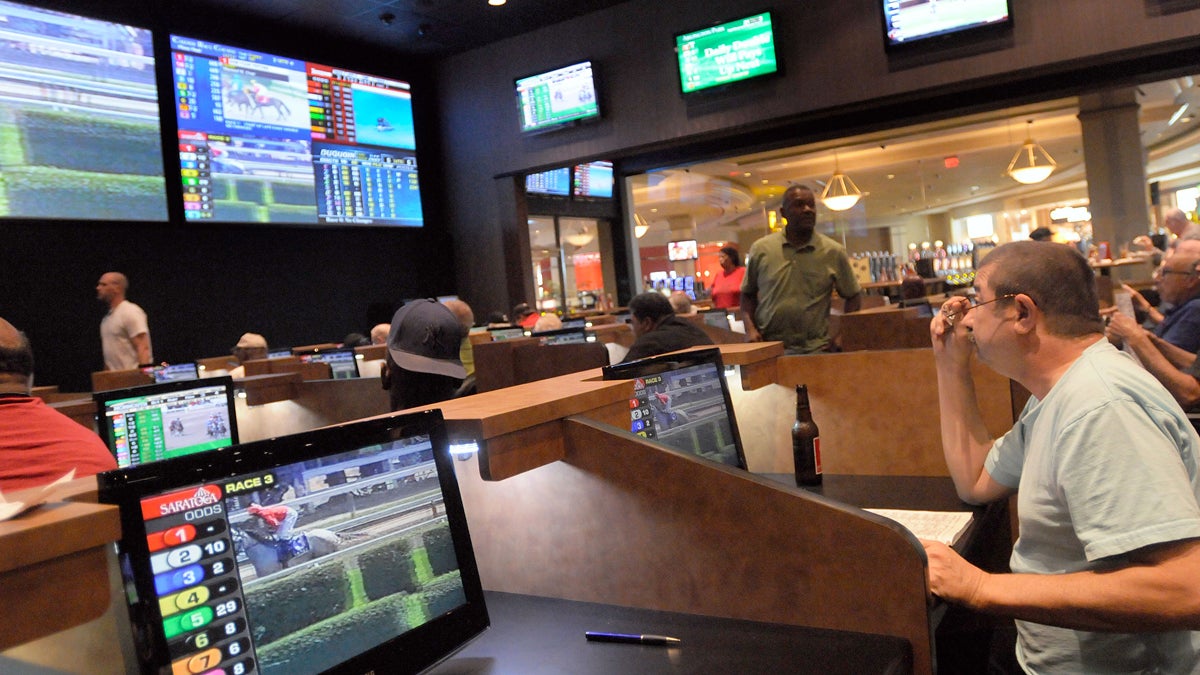Full-scale sports betting no ‘big windfall,’ Delaware casino operators say
Delaware launches its full-scale sports betting Tuesday afternoon, but the additional gambling options are not seen as a cure-all by Delaware casino operators.

A sports betting room in Delaware. (Steve Ruark/AP, file)
Delaware prides itself as “The First State,” and that nickname is ringing true once again as the state becomes the first outside of Nevada to launch full-scale sports betting on professional baseball, football, hockey, basketball, soccer, golf, and auto racing. But after the celebrating that will surround Tuesday’s opening bets, there’s concern about competition facing Delaware’s casinos.
Dover Downs Casino CEO Ed Sutor said he is happy to offer gamblers more options, but he’s tamping down expectations of full-scale sports betting as a panacea.
“We don’t think there’s going to be a windfall for the state of Delaware,” Sutor said. “We’ll take it, because it’s going to be available, but I don’t think anyone should expect a big windfall because other states all around us are going to be having the same thing.”
Since 2009, the state has brought in modest revenue by offering parlay bets on NFL games. In 2017, gamblers wagered $3.6 million on NFL games. The state paid out $1.3 million in winnings to bettors, and it collected nearly $2 million in net proceeds.
In 2017, Dover Downs reported a million-dollar loss for the year. The company reported a $361,000 loss for the first quarter of 2018 on revenue of about $43 million. Sports betting won’t move the needle much on those losses, Sutor said.
Instead, he and other gaming operators in the state have been pushing for a reduction in the rates the casinos pay to the state.
In a statement detailing its annual earnings, Dover Downs’ Denis McGlynn blamed the state’s take for gutting the casino’s profit.
“Once again, the company demonstrated substantial gaming operations profitability, which once again was totally wiped out by an unfair and outdated gaming revenue sharing formula,” McGlynn said.
In late April, the Senate passed a bill to reduce the state’s cut of gaming revenue. In a 17-3 vote, senators approved lowering the state’s share of gross table game revenues from 29.4 percent to 15.5 percent. The measure also calls for cutting the state’s share of gross slot machine revenues by about 2 percentage points. According to the state controller general’s office, those changes would decrease revenue by $15 million in the coming fiscal year, and by $20 million in each of the next two.
Unlike sports betting, Sutor said, the legislation could put Delaware’s three casinos on firmer financial ground.
“It wasn’t everything we were looking for, but we’ll take what we can get and hopefully that bill gets processed by the House and signed by the governor before the end of this fiscal year,” he said.
WHYY is your source for fact-based, in-depth journalism and information. As a nonprofit organization, we rely on financial support from readers like you. Please give today.





